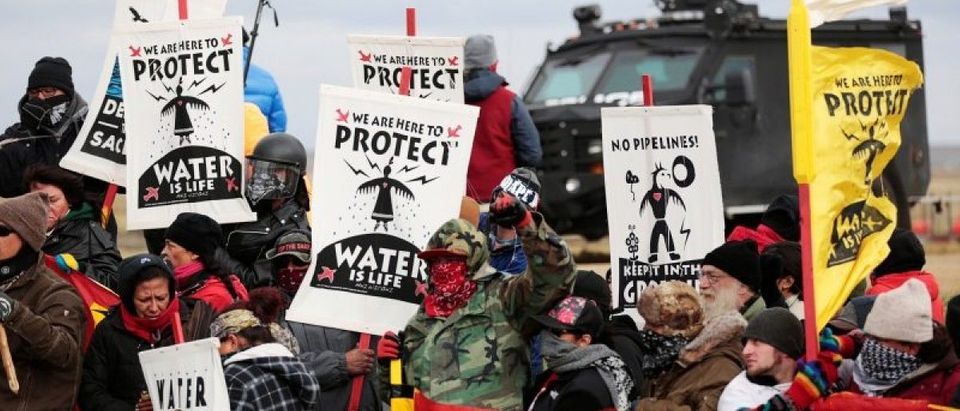Proponents of the Dakota Access Pipeline believe the American Indian tribe protesting the project is more concerned about getting “easy money” than protecting water supply.
Developers of the pipeline offered to install water quality sensors, construction of a fresh water storage facility to store water in case of a pipeline leak to the Standing Rock Sioux tribe protesting the pipeline, sources close to the discussion told The Washington Examiner Sunday.
The sources also claimed the so-called DAPL offered the tribe emergency vehicles in the event the pipeline ruptured. It wasn’t enough. The tribe demanded a shipping fee for delivering the oil, according to the report.
“Even though the pipeline never crosses the Standing Rock Sioux reservation, Energy Transfer Partners has attempted to be a good neighbor by offering water testing and monitoring, as well as significant community support to the tribe,” the source said.
The source added: “But time and again the tribe rebuffed or ignored the company’s offers demanding, instead, a toll on the crude that passed through the pipeline, an ultimatum that showed the tribe’s true desire — easy money.”
Standing Rock tribe members have consistently argued the pipeline’s construction would trample on tribal lands and possibly poison waterways, including rivers such as the Missouri River and Lake Oahe in North Dakota.
Energy Transfer Partners, the company behind the DAPL, balked at the conditions, and instead offered to pay for infrastructure improvements on the reservation according to the tribe’s own priorities.
The treaty was forged between the U.S. government and the Great Sioux Nation, not Standing Rock. Still, tribe members have challenged the treaty and others like it in court for not being honored.
The company is currently weaving its way through the courts, regulatory morass, and environmentalist protests to build the multi-billion-dollar pipeline, which is expected to bring 470,000 barrels of Bakken crude oil per day from western North Dakota to southern Illinois.
Construction is being delayed by the Obama administration supposedly to give the government more time to determine the environmental impact it would have on Standing Rock’s reservation.
The Army Corps of Engineers, at President Barack Obama’s direction, moved to momentarily halt the project again despite having reviewed more than 1,200 pages of environmental and cultural analysis over the past three years, as well as consulting with 55 American Indian tribes nearly 400 times.
The company’s CEO remains unfazed, telling reporters Nov. 17 that the hotly contested line is going forward regardless protester concerns.
North Dakotans are generally “wonderful people, law-abiding, nonviolent people. And they’re trying to go about their lives,” Kelcey Warren said in an interview with PBS News Hour.
The protests have been anything but peaceful, he said, adding that, “if they want to stick around and continue to do what they’re doing, great, but we’re building the pipeline.”
Follow Chris on Facebook and Twitter
All content created by the Daily Caller News Foundation, an independent and nonpartisan newswire service, is available without charge to any legitimate news publisher that can provide a large audience. All republished articles must include our logo, our reporter’s byline and their DCNF affiliation. For any questions about our guidelines or partnering with us, please contact licensing@dailycallernewsfoundation.org.


